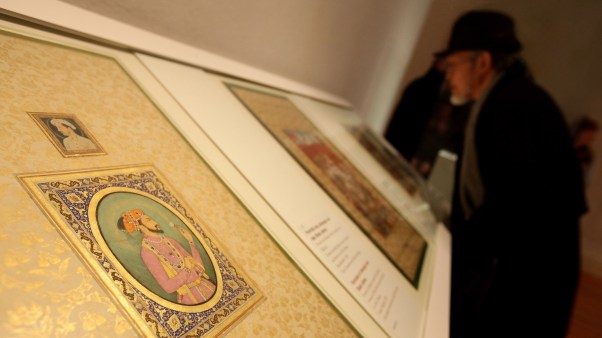This Rebellious House: American History and the Truth of Christianity,by Steven J. Keillor (InterVarsity, 368 pp.; $24.99, paper). Reviewed by John Wilson.
The assault on Christian belief in our colleges and universities takes many forms. One of the most potent is via courses in American history, where professors routinely blame Christianity for a multitude of injustices—and thereby suggest that its truth-claims are worthless. Steven Keillor’s reinterpretation of American history is explicitly intended to counter such anti-Christian polemics. But his book does not take the form you might expect.
On the one hand, Keillor draws heavily on the revisionist scholarship of the past 30 years—scholarship that emphasizes the dark side of American history. So there is a good deal here about slavery and racial injustice, patriarchy, and the insidious force of capitalism (which functions in Keillor’s narrative as the demonic powers might in the writings of a third-century Christian chronicler). Moreover, Keillor emphatically rejects American exceptionalism. The United States, he argues, was not founded as a Christian nation, nor is its history privileged in comparison to that of other nations. (Don’t hold your breath waiting for the Family Research Council to endorse this book.)
On the other hand, Keillor speaks forthrightly about God’s providence and human rebellion against God’s plan in a manner shunned by many prominent evangelical historians, let alone your typical thoroughly secularized academic, who would be likely to regard such pronouncements as if Keillor had suddenly started talking about UFOs in the middle of an exposition of the the Monroe Doctrine. The result is a fresh and provocative reading of American history that challenges assumptions right and left.
Keillor begins with a serious misstep that could lose him the trust of many readers at the outset. While conceding that so-called indigenous peoples did not live in paradisiacal bliss before the invasion of the White Man (there were those Aztec sacrifices, for example), he nevertheless asks us to imagine largely peaceful and static indigenous societies in which—because their belief systems were “constructed by humans to achieve human goals”—there was nothing to rebel against, in contrast to the violent, dynamic societies of the Europeans, whose “religion was not an integrated, harmonious human-centered belief system but a traveling argument between their God and them.” It’s an interesting theory, but it simply does not fit the evidence. See, for example, the flood of recent scholarship on Mayan civilization, which has radically revised and historicized our understanding of that culture—and which has laid to rest the long-cherished myth of the serene and peaceful Mayan culture.
Readers tempted to stop reading right there in chapter 1 should persist. They will be richly rewarded. Consider, for example, Keillor’s treatment of family issues, in part in response to the oft-heard charge “that the Christian faith has served to delay or defeat women’s emancipation just as it is alleged (incorrectly) to have delayed blacks’ emancipation.”
Keillor’s account will displease both secular feminists and many conservative Christians who cling to an anachronistic model of the family. He shows how the development of “separate spheres” for men and women in nineteenth-century America (men in the world of work and the public square, women in the world of home and family—a private realm to which religion was increasingly consigned) grew in part out of changes brought by industrial capitalism, as employment shifted from the farm or the home-workplace to the factory or the office.
At the same time, Keillor observes,
A battle between revival and male rebellion helped to shape the first transition to separate spheres. Rebelling against God meant distancing oneself from home, especially in cities. Changes in work patterns distanced men from the home, but they sought distance as much as economic changes forced it on them.
One consequence of this male rebellion was a dramatic increase in prostitution. In New York City before 1820, Keillor notes, “only transient males, such as soldiers and sailors, visited prostitutes.” Between 1820 and 1865, however, “brothels tripled in number and spread to respectable areas. A sporting male culture that glorified promiscuity multiplied the potential clients.” The same period saw a marked increase in the abuse of women. “All this,” Keillor reminds us, “came before Darwin, before secularization, when evangelical religion dominated national life as never before or since.”
Equally fresh and compelling is Keillor’s treatment of the missionary impulse in America. Here is one of the favorite themes of the Christian-bashers (indeed, it is not infrequently heard even at Christian institutions). “Many historians’ paradigm is this: Christian proselytizers disturb other cultures, fail to make converts, and largely deserve the anger and violence they receive. The evidence shatters that paradigm.” Offering a bracing critique of textbook treatments in which global evangelization is “unreported or distorted,” Keillor goes on to survey the impact of Christian missions in China, Japan, Korea, and the Philippines.
Keillor is not an elegant writer (e.g., “Unlike the old Cold War, the United States will not be the good empire that battles Antichrist’s evil empire”), but he is clear—clear and assertive enough that any reader who finishes this energizing book will have some bones to pick with the author. We can hope that come next fall, many American history students will be learning from Keillor and carrying on the argument.
Copyright © 1996 Christianity Today. Click for reprint information.










